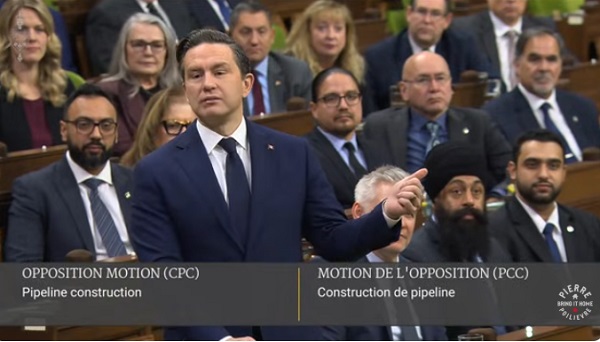Business
Here’s What Happened When A German Man Got Stuck In Calgary Amid COVID-19

A German traveller stuck in Canada as a result of the COVID-19 global pandemic is the latest addition to the Business on Camera team in Calgary, Alberta. Josef Bodenbenner, from Marburg, Germany speaks English, Spanish and German and is BOC’s new Director of International Language and Culture.

Business on Camera is an award-winning documentary film company and visual public relations firm established in 2010 specializing in corporate communications and video marketing. BOC works best with entrepreneurs pursuing radical social change and energy companies seeking communications support in the areas of video, PR, and social media marketing.
“If I would have found a Calgarian with the same skill set I would have hired them,” begins Matt Keay, Business on Camera CEO, “Josef can read, write and speak German, Spanish and English. On top of that, he brings eight years of experience in finance and international banking, plus he is a Supple Leopard.”
Although his original plans were derailed by COVID-19, Josef has seized this new opportunity with excitement and is thrilled to be a part of the BOC team. “It’s amazing to be here and see what is happening with Business on Camera,” he says, “there is the social aspect with their documentary film production, and they are supporting Alberta companies like Eavor Technologies Inc. in exporting their technology around the globe.”
Drawing on his years of financial experience overseas and multilingual capabilities, Josef has quickly become a key player in elevating BOC during the COVID-19 crisis. “We are sourcing new production partnerships in film and TV,” he says, “exploring tax and currency advantages, researching compliance protocols and working to attract investment to the province.”
Bringing on team members from outside of Canada, particularly during a pandemic, can be a tricky process. To ensure best practices, Business on Camera referred to the Government of Canada and Government of Alberta websites for the latest information regarding updated employer practices during COVID-19. Working with Josef to ensure work visa compliance, BOC was able to successfully bring him on board as the official Director of International Language and Culture.
Sensitive to the COVID-19 situation, BOC remains humble as their team works quietly away at Work Nicer Coworking in Calgary’s Beltline, grateful for the opportunity for continued expansion. Work Nicer Coworking is Alberta’s fastest-growing Coworking Community with over 600 members throughout their Calgary and Edmonton Locations.
Josef can be reached by phone at 403-478-3836 or [email protected].
For more stories, visit Todayville Calgary.
Business
Storm clouds of uncertainty as BC courts deal another blow to industry and investment

From the Fraser Institute
By Tegan Hill and Jason Clemens
Recent court decision adds to growing uncertainty in B.C.
A recent decision by the B.C. Court of Appeal further clouds private property rights and undermines investment in the province. Specifically, the court determined British Columbia’s mineral claims system did not follow the province’s Declaration on the Rights of Indigenous Peoples Act (DRIPA), which incorporated the United Nations Declaration on the Rights of Indigenous Peoples (UNDRIP) into law.
DRIPA (2019) requires the B.C. provincial government to “take all measures necessary to ensure the laws of British Columbia are consistent with the Declaration,” meaning that all legislation in B.C. must conform to the principles outlined in the UNDRIP, which states that “Indigenous peoples have the right to the lands, territories and resources which they have traditionally owned, occupied or otherwise used or acquired.” The court’s ruling that the provincial government is not abiding by its own legislation (DRIPA) is the latest hit for the province in terms of ongoing uncertainty regarding property rights across the province, which will impose massive economic costs on all British Columbians until it’s resolved.
Consider the Cowichan First Nations legal case. The B.C. Supreme Court recently granted Aboriginal title to over 800 acres of land in Richmond valued at $2.5 billion, and where such aboriginal title is determined to exist, the court ruled that it is “prior and senior right” to other property interests. Put simply, the case puts private property at risk in BC.
The Eby government is appealing the case, yet it’s simultaneously negotiating bilateral agreements that similarly give First Nations priority rights over land swaths in B.C.
Consider Haida Gwaii, an archipelago on Canada’s west coast where around 5,000 people live—half of which are non-Haida. In April 2024, the Eby government granted Haida Aboriginal title over the land as part of a bilateral agreement. And while the agreement says private property must be honoured, private property rights are incompatible with communal Aboriginal title and it’s unclear how this conflict will be resolved.
Moreover, the Eby government attempted to pass legislation that effectively gives First Nations veto power over public land use in B.C. in 2024. While the legislation was rescinded after significant public backlash, the Eby’s government’s continued bilateral negotiations and proposed changes to other laws indicate it’s supportive of the general move towards Aboriginal title over significant parts of the province.
UNDRIP was adopted by the United Nations in 2007 and the B.C. Legislature adopted DRIPA in 2019. DRIPA requires that the government must secure “free, prior and informed consent” before approving projects on claimed land. Premier Eby is directly tied to DRIPA since he was the attorney general and actually drafted the interpretation memo.
The recent case centres around mineral exploration. Two First Nations groups—the Gitxaala Nation and the Ehattesaht First Nation—claimed the duty to consult was not adequately met and that granting mineral claims in their land “harms their cultural, spiritual, economic, and governance rights over their traditional territories,” which is inconsistent with DRIPA.
According to a 2024 survey of mining executives, more uncertainty is the last thing B.C. needs. Indeed, 76 per cent of respondents for B.C. said uncertainty around protected land and disputed land claims deters investment compared to only 29 per cent and 44 per cent (respectively) for Saskatchewan.
This series of developments have and will continue to fuel uncertainty in B.C. Who would move to or invest in B.C. when their private property, business, and investment is potentially at risk?
It’s no wonder British Columbians are leaving the province in droves. According to the B.C. Business Council, nearly 70,000 residents left B.C. for other parts of Canada last year. Similarly, business investment (inflation-adjusted) fell by nearly 5 per cent last year, exports and housing starts were down, and living standards in the province (as measured by per-person GDP) contracted in both 2023 and 2024.
B.C.’s recent developments will only worsen uncertainty in the province, deterring investment and leading to stagnant or even declining living standards for British Columbians. The Eby government should do its part to reaffirm private property rights, rather than continue fuelling uncertainty.
Business
Conservative MP warns Liberals’ national AI plan could increase gov’t surveillance

From LifeSiteNews
Conservative MP Leslyn Lewis raised concerns about the Liberals’ major investment in AI, which could lead to digital ids and loss of freedoms.
Conservative MP Leslyn Lewis is sounding the alarm over the Liberals’ nearly billion-dollar AI infrastructure investment, which could lead to digital IDs
In a December 2 post on X, Lewis raised concerns over the Liberals’ 2025 budget, which funds a $925.6 million “Sovereign Canadian Cloud” and national AI compute infrastructure at the same time as the Liberals are pushing digital identification on Canadians.
“Who audits the algorithms behind government’s new digital systems?” Lewis challenged. “What protections exist for Canadians in this new infrastructure? Who builds it? Who controls it? Who owns the data?”
“Good technology isn’t the issue, our freedoms, surveillance and good accountable governance in a digital era are the real issues,” she warned.
“Digital infrastructure is power, and it must never be implemented in secrecy or without parliamentary scrutiny,” Lewis declared.
Despite spending nearly one billion taxpayer dollars on the project, Prime Minister Mark Carney provides surprisingly few details on how the infrastructure will work and what its purpose will be.
“Budget 2025 proposes to provide $925.6 million over five years, starting in 2025-26, to support a large-scale sovereign public AI infrastructure that will boost AI compute availability and support access to sovereign AI compute capacity for public and private research,” the budget read.
“The investment will ensure Canada has the capacity needed to be globally competitive in a secure and sovereign environment,” it continued.
Alarmingly, the funding comes at the same time as Liberals are moving forward with digital identification systems, despite warnings that they will infringe on Canadians freedoms.
In November, as reported by LifeSiteNews, Liberals moved ahead with digital identification for anyone seeking federal benefits, including seniors on Old Age Security.
Additionally, the Canadian government hired outside consultants tasked with looking into whether or not officials should proceed with creating a digital ID system for all citizens and residents.
Per a May 20 Digital Credentials Issue memo, and as noted by Blacklock’s Reporter, the “adoption” of such a digital ID system may be difficult.
Canada’s Privy Council research from 2023 noted that there is strong public resistance to the use of digital IDs to access government services.
Nonetheless, Conservative leader Pierre Poilievre sounded the alarm by promising to introduce a bill that would “expressly prohibit” digital IDs in Canada.
Critics have warned that the purpose of such IDs is actually to centralize control over citizens. This opinion seems to be mirrored by the general public, with a Bank of Canada survey finding that Canadians are wary of a government-backed digital currency, concluding that a “significant number” of citizens would resist the implementation of such a system.
Digital IDs and similar systems have long been pushed by globalist groups like the World Economic Forum, an organization with which Carney has extensive ties, under the guise of ease of access and security.
-

 National24 hours ago
National24 hours agoLiberal bill “targets Christians” by removing religious exemption in hate-speech law
-

 Business2 days ago
Business2 days agoThe EU Insists Its X Fine Isn’t About Censorship. Here’s Why It Is.
-

 Business2 days ago
Business2 days agoCanada invests $34 million in Chinese drones now considered to be ‘high security risks’
-

 Economy2 days ago
Economy2 days agoAffordable housing out of reach everywhere in Canada
-

 Bruce Dowbiggin2 days ago
Bruce Dowbiggin2 days agoWayne Gretzky’s Terrible, Awful Week.. And Soccer/ Football.
-

 Business20 hours ago
Business20 hours agoLooks like the Liberals don’t support their own Pipeline MOU
-

 Health2 days ago
Health2 days agoCDC Vaccine Panel Votes to End Universal Hep B Vaccine for Newborns
-

 Health1 day ago
Health1 day agoThe Data That Doesn’t Exist






